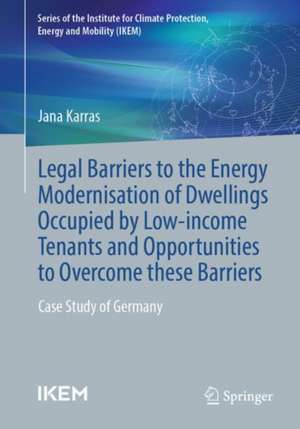Legal barriers to the energy modernisation of dwellings occupied by low-income tenants and opportunities to overcome these barriers: Case study of Germany: Schriftenreihe des Instituts für Klimaschutz, Energie und Mobilität
Autor Jana Karrasen Limba Engleză Paperback – 4 iun 2024
Preț: 728.28 lei
Preț vechi: 888.14 lei
-18% Nou
Puncte Express: 1092
Preț estimativ în valută:
139.36€ • 145.87$ • 115.99£
139.36€ • 145.87$ • 115.99£
Carte disponibilă
Livrare economică 10-24 martie
Preluare comenzi: 021 569.72.76
Specificații
ISBN-13: 9783658441920
ISBN-10: 3658441925
Pagini: 250
Ilustrații: XV, 223 p. 1 illus. in color.
Dimensiuni: 168 x 240 mm
Greutate: 0.46 kg
Ediția:2024
Editura: Springer Fachmedien Wiesbaden
Colecția Springer
Seria Schriftenreihe des Instituts für Klimaschutz, Energie und Mobilität
Locul publicării:Wiesbaden, Germany
ISBN-10: 3658441925
Pagini: 250
Ilustrații: XV, 223 p. 1 illus. in color.
Dimensiuni: 168 x 240 mm
Greutate: 0.46 kg
Ediția:2024
Editura: Springer Fachmedien Wiesbaden
Colecția Springer
Seria Schriftenreihe des Instituts für Klimaschutz, Energie und Mobilität
Locul publicării:Wiesbaden, Germany
Cuprins
Introduction.- Research methodology.- Current state of research in defined area from energy efficiency point of view.- EU regulative framework.- Country reports and their comparative analysis.- Possible solutions.- Description of results.- Conclusion.
Notă biografică
Jana Karras specialises in German and Ukrainian law, international climate policy and climate finance. She has experience in international research and consultancy projects on developing and overseeing capacity building and knowledge sharing activities. Jana Karras focuses on the financing of the energy transition and climate measures, the evaluation of policy approaches in the field of energy efficiency and climate policy at the global, regional, national, and local levels. Jana Karras accessed national institutional and financial capacities and developed options to improve the access to the IKI and was involved in the development of climate change projects in Central Asia, East and South Europe. She contributed to the work on assessing legal and financing options for Berlin and Spree-Neiße to facilitate energy transition in the project “Energy Transition in Social Space – ESRa and to enabling exchange with best practices on financing the implementation of climate and energy management in municipalities of Germany, Slovakia, and Czechia with project “EnPowerClimate” (EUKI/BMU). Jana Karras holds a master’s degree in law from the National University “Law Academy of Ukraine named after Yaroslav Mudryi”. She has also successfully passed the first state examination in law in Germany (Diplom-Juristin, Greifswald University) and is currently completing her legal clerkship at the Naumburg Higher Regional Court in Saxony-Anhalt.
Textul de pe ultima copertă
This book explores the legal barriers to energy modernisation in Germany's residential building sector, especially when low-income tenants are involved. It also examines potential solutions to the landlord-tenant dilemma and how they may be applied within the German legal framework. The concept of energy poverty in Germany and Sweden is explored, and how these countries address it (or don't) within their legal frameworks. The reader can explore the landlord-tenant dilemma and the hurdles faced when trying to invest in energy modernization, with a special focus on low-income tenants. This book takes an in-depth look at the legal landscape, exploring both EU policies and national regulations. Sweden's experience, especially its use of municipal green bonds to finance energy transition projects, offers a valuable lesson for Germany. Drawing on comparative insights from Sweden, which has made strides in addressing similar issues, the book aims to identify transferable legal strategies to facilitate energy transition in the rental housing market.Audience
Methodology – Current state of research in defined area from energy efficiency point of view – EU regulative framework – Country reports and their comparative analysis – Possible solutions – Description of results
About the author
Jana Karras specialises in German and Ukrainian law, international climate policy and climate finance. She has experience in international research and consultancy projects on developing and overseeing capacity building and knowledge sharing activities.
- Polycymakers, Legal Professionals, Advocates for Social and Climate Justice
- Environmentalists, Housing Authorities
- Researchers, Academics
Methodology – Current state of research in defined area from energy efficiency point of view – EU regulative framework – Country reports and their comparative analysis – Possible solutions – Description of results
About the author
Jana Karras specialises in German and Ukrainian law, international climate policy and climate finance. She has experience in international research and consultancy projects on developing and overseeing capacity building and knowledge sharing activities.
Caracteristici
Offers innovative solutions for climate change, focusing on energy modernization in low-income tenant-occupied dwellings Analyses regulations, economics, and social dynamics impacting residential energy efficiency comprehensively Provides legal solutions for energy efficiency, bridging climate goals and low-income tenants' challenges




